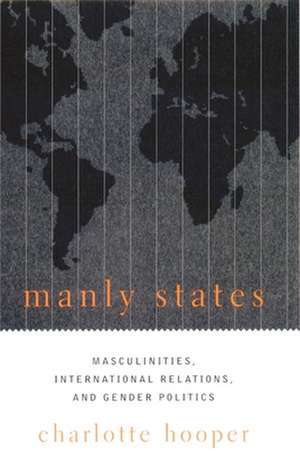Manly States – Masculinities, International Relation, & Gender Politics
Autor Charlotte Hooperen Limba Engleză Paperback – 19 mar 2001
This volume asserts that international politics shapes multiple masculinities rather than one static masculinity, positing an interplay between a "hegemonic masculinity" (associated with elite, western male power) and other subordinated, feminized masculinities (typically associated with poor men, nonwestern men, men of color, and/or gay men). Employing feminist analyses to confront gender-biased stereotyping in various fields of international political theory -- including academic scholarship, journals, and popular literature like The Economist -- Hooper reconstructs the nexus of international relations and gender politics during this age of globalization.
Preț: 270.32 lei
Nou
Puncte Express: 405
Preț estimativ în valută:
51.73€ • 53.81$ • 42.71£
51.73€ • 53.81$ • 42.71£
Carte tipărită la comandă
Livrare economică 14-28 aprilie
Preluare comenzi: 021 569.72.76
Specificații
ISBN-13: 9780231120753
ISBN-10: 0231120753
Pagini: 310
Dimensiuni: 150 x 247 x 17 mm
Greutate: 0.46 kg
Ediția:New.
Editura: Columbia University Press
Locul publicării:United States
ISBN-10: 0231120753
Pagini: 310
Dimensiuni: 150 x 247 x 17 mm
Greutate: 0.46 kg
Ediția:New.
Editura: Columbia University Press
Locul publicării:United States
Notă biografică
Charlotte Hooper
Cuprins
List of Illustrations
Acknowledgments
Introduction
Part I. Theorizing Masculinities
1. The Construction of Gender Identity
2. Masculinities and Masculinism
Part II. Masculinities, IR, and Gender Politics
3. Masculinities in International Relations
4. The Economist's Masculine Credentials
5. The Economist, Globalization, and Masculinities
6. The Economist/IR Intertext
Conclusion: IR and the (Re)Making of Hegemonic Masculinity
Notes
Reference List and Bibliography
Index
Acknowledgments
Introduction
Part I. Theorizing Masculinities
1. The Construction of Gender Identity
2. Masculinities and Masculinism
Part II. Masculinities, IR, and Gender Politics
3. Masculinities in International Relations
4. The Economist's Masculine Credentials
5. The Economist, Globalization, and Masculinities
6. The Economist/IR Intertext
Conclusion: IR and the (Re)Making of Hegemonic Masculinity
Notes
Reference List and Bibliography
Index
